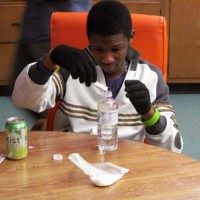Reaching them young prevents problems later
(Photo by Paul Gordon) A student at Manual Academy in Peoria pours a packet of sugar-free flavoring mix into a bottle of water as he learns there are good-tasting and more nutritious alternatives to soda. He was part of a wellness class being taught at the school.As a person whose weight fluctuates often from pudgy to obese and back again, I applaud the efforts of those working now to curb childhood obesity so that the children of today won't be Jay Leno jokes of tomorrow.
I can't help but think if I had been given a good education on nutrition when I was a pre-teen or a teen perhaps I would have better eating and exercise habits now. It's not too late to change, I know; but it sure isn't easy. Learning good habits early makes it that much easier to maintain them as adults.
That is sort of the message being given to students at Manual Academy in Peoria who are participating in a pilot wellness program sponsored by Quality Quest for Health of Illinois and the American Cancer Society. The Healthy Living Program received a $13,400 grant from the cancer society and was started under the direction of Dr. Amy Christison, a pediatrician who has been waging a war against childhood obesity for a few years now.
The program at Manual started last month and consists of three sessions of six to eight weeks. The goal is to reach 130 students through the three sessions that include nutrition education, exercise in the form of dance instruction provided by City Dance and gardening so students can learn the value of growing their own food.
According to the Cancer Society, obesity and poor nutrition have joined tobacco as leading causes of cancer. Studies show that 50 percent of overweight children and 70 percent of overweight adolescents will be overweight as adults, the Cancer Society said. Illinois, it said, ranks 10th highest in the country for children ages 10 to 17 who are overweight and obese.
Carrie Trent-Newman, a senior health initiatives representative with the American Cancer Society, said the Cancer Society became interested in the program because of its uniqueness. "It's the only one like it in the state and we wanted to help move it along because if a child can learn good nutrition at an early age we as a society won't see as many problems as they get older," she said.
Tina Schallhorn, a pediatric dietician at Methodist Medical Center, said the program has a good chance of working because it teaches the students about the nutritional values —or the lack thereof — of some of the foods that are constants in their daily diet. On Wednesday, for example, the students were learning about the sugar content and calories in soda.
"Most of these kids drink soda every day. Too much of it isn't good for them. We try to teach them about moderation and show them alternatives," Schallhorn said while Mollie Dungen, a dietician intern at Methodist, served the students water from a pitcher in which there were sliced lemons. She also gave the students packets or sugar-free flavoring powders to pour into their water.
"Another important aspect of the program is that we are teaching these kids things that they then can take home with them at the end of the day. That is a good way for their parents and family members to learn better nutrition, as well," she said.
The Cancer Society said obesity and poor nutrition have definite links to such cancers as colorectal, breast, esophageal, kidney, pancreatic, stomach and liver. I had heard that before, but it has never been at the forefront of my mind when I've been enjoying a double cheeseburger or that fourth slice of pizza.
Maybe I can change that. I was able to quit smoking more than five years ago after 35 years of using tobacco. I have cut way back on the amount of soda I drink, enjoying it only when eating something that demands carbonation (Mexican fare, pizza, chili).
I hope the efforts of these folks, particularly Dr. Christison, can keep today's youth from thinking like that when they become old like me. But they need the help of parents and grandparents and anyone else who can influence what kids eat.
This is a battle that will be tough to win in a society that embraces phrases such as "Want fries with that?"

